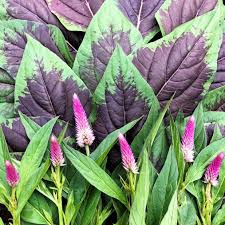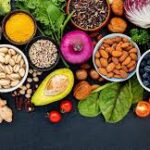Efo Shoko: The Underrated Power Leaf in Yoruba Cuisine

Common Name: Lagos Spinach
Yoruba Name: ├łf├▓ Shokoyokoto (shortened as Efo Shoko)
Botanical Name: Celosia argentea
Family: Amaranthaceae
¤ī┐ Introduction
Efo Shoko, also known as Lagos spinach or feather cockscomb, is a highly nutritious leafy vegetable that holds a significant place in Yoruba cuisine and traditional medicine. Despite its somewhat modest appearance, Efo Shoko is a powerhouse of nutrients and therapeutic properties. Its deep green to purplish leaves and slightly bitter taste are characteristic, making it a preferred choice in dishes such as efo riro, ogbono, and even herbal concoctions.
ŌĆ£Beat the Pressure: A Comprehensive Guide to Lowering Blood Pressure Naturally.ŌĆØ
Buy book from Gumroad or Paystack
¤ÅĪ Origin and Cultivation
Efo Shoko is native to West Africa, especially Nigeria, and thrives in tropical climates. It grows quickly, even in less fertile soils, and is commonly cultivated in backyard gardens and smallholder farms. The plant is easily identifiable by its broad, tender leaves and bright pinkish-purple stems and flowers. It is a fast-growing annual and matures in as little as 4 to 6 weeks after planting.
¤¦¬ Nutritional Value (per 100g of fresh leaves)
- Calories: ~24 kcal
- Protein: ~3.2 g
- Fiber: ~1.5 g
- Iron: ~5.3 mg
- Calcium: ~215 mg
- Vitamin A: High (as beta-carotene)
- Vitamin C: ~60 mg
- Magnesium, Potassium, Zinc
These nutrients make Efo Shoko an excellent food for maintaining general health and fighting nutrient deficiencies.
¤ÆÜ Health Benefits of Efo Shoko
1. Blood Building and Anemia Prevention
Efo Shoko is rich in iron and folate, key nutrients that support red blood cell formation and help combat anemia, especially in women and children.
2. Eye Health
With its high beta-carotene (pro-vitamin A) content, regular consumption of Efo Shoko supports good vision and may help prevent night blindness.
3. Immune Support
The vitamin C in Efo Shoko helps boost the immune system, aiding in faster recovery from infections and enhancing the bodyŌĆÖs ability to fight disease.
4. Bone and Muscle Health
It contains calcium and magnesium, vital for strong bones, teeth, and muscle function, making it beneficial for both growing children and aging adults.
5. Digestive Health
Efo Shoko provides dietary fiber, which supports healthy digestion, prevents constipation, and promotes regular bowel movement.
6. Detoxification and Anti-inflammatory Action
The leaf has natural detoxifying properties and contains antioxidants that help cleanse the liver and reduce inflammation in the body.
¤ŹĮ’ĖÅ Culinary Uses
Efo Shoko is best known for its use in efo riro, a rich Yoruba-style vegetable stew made with peppers, onions, palm oil, and assorted proteins like beef, snail, or fish.
Other ways to prepare Efo Shoko include:
- Lightly steamed and served as a side dish.
- Stir-fried with eggs and onions.
- Blended into green smoothies for an extra nutrient punch.
- Cooked with melon seed (egusi) or okra for a mixed vegetable soup.
¤æ®ŌĆŹ¤īŠ How to Grow Efo Shoko at Home
Efo Shoko is ideal for home gardening. Here’s a brief guide:
- Soil: Well-drained, loamy soil rich in organic matter.
- Planting: Use seeds directly sown in the ground or starter pots.
- Sunlight: Requires full sun to thrive.
- Watering: Water regularly but avoid waterlogging.
- Harvesting: Start harvesting leaves within 4ŌĆō6 weeks.
Frequent harvesting encourages more leaf growth and prolongs the plant’s productivity.
ŌÜĀ’ĖÅ Precautions
- Like other leafy greens, Efo Shoko should be washed thoroughly to remove sand and insects before cooking.
- It may lose some nutrients if overcookedŌĆölight steaming or short cooking durations are best.
¤īŹ Cultural Significance
In Yoruba tradition, Efo Shoko is more than just foodŌĆöit is seen as medicine and sustenance. Pregnant women, nursing mothers, and those recovering from illness are often encouraged to eat it to regain strength and vitality.
Its affordability and wide availability make it a staple in Nigerian kitchens, especially in urban areas like Lagos, Ibadan, and Abeokuta.
Ō£ģ Conclusion
Efo Shoko may be humble in appearance, but itŌĆÖs a giant in health benefits and culinary versatility. Rich in essential nutrients and deeply rooted in Nigerian culture, it deserves a prominent place in every householdŌĆÖs meal plan. Whether youŌĆÖre aiming to improve your health, save on groceries, or enjoy delicious local dishes, Efo Shoko is the leaf to love.
┬Ā
¤Æö ŌĆ£She said she loved me. And for fifty-two years, I believed her.ŌĆØ ¤Æö
Buy The Book "The Longest Lie: A HusbandŌĆÖs Journey Through Love, Betrayal, and Redemption" From Gumroad
┬Ā






